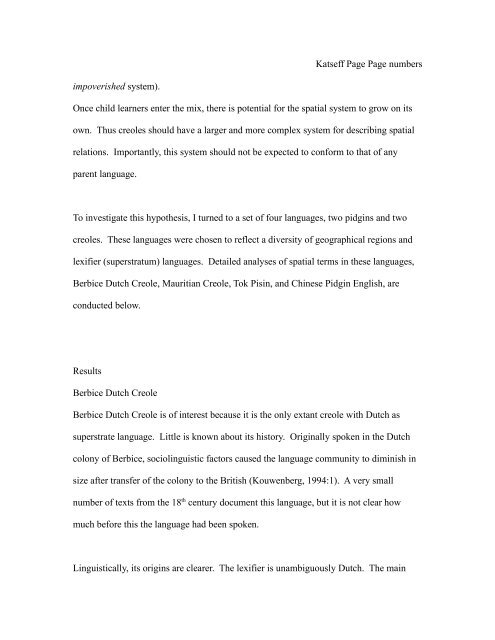The case of pidgin and creole languages - Linguistics
The case of pidgin and creole languages - Linguistics
The case of pidgin and creole languages - Linguistics
Create successful ePaper yourself
Turn your PDF publications into a flip-book with our unique Google optimized e-Paper software.
impoverished system).<br />
Katseff Page Page numbers<br />
Once child learners enter the mix, there is potential for the spatial system to grow on its<br />
own. Thus <strong>creole</strong>s should have a larger <strong>and</strong> more complex system for describing spatial<br />
relations. Importantly, this system should not be expected to conform to that <strong>of</strong> any<br />
parent language.<br />
To investigate this hypothesis, I turned to a set <strong>of</strong> four <strong>languages</strong>, two <strong>pidgin</strong>s <strong>and</strong> two<br />
<strong>creole</strong>s. <strong>The</strong>se <strong>languages</strong> were chosen to reflect a diversity <strong>of</strong> geographical regions <strong>and</strong><br />
lexifier (superstratum) <strong>languages</strong>. Detailed analyses <strong>of</strong> spatial terms in these <strong>languages</strong>,<br />
Berbice Dutch Creole, Mauritian Creole, Tok Pisin, <strong>and</strong> Chinese Pidgin English, are<br />
conducted below.<br />
Results<br />
Berbice Dutch Creole<br />
Berbice Dutch Creole is <strong>of</strong> interest because it is the only extant <strong>creole</strong> with Dutch as<br />
superstrate language. Little is known about its history. Originally spoken in the Dutch<br />
colony <strong>of</strong> Berbice, sociolinguistic factors caused the language community to diminish in<br />
size after transfer <strong>of</strong> the colony to the British (Kouwenberg, 1994:1). A very small<br />
number <strong>of</strong> texts from the 18 th century document this language, but it is not clear how<br />
much before this the language had been spoken.<br />
Linguistically, its origins are clearer. <strong>The</strong> lexifier is unambiguously Dutch. <strong>The</strong> main

















